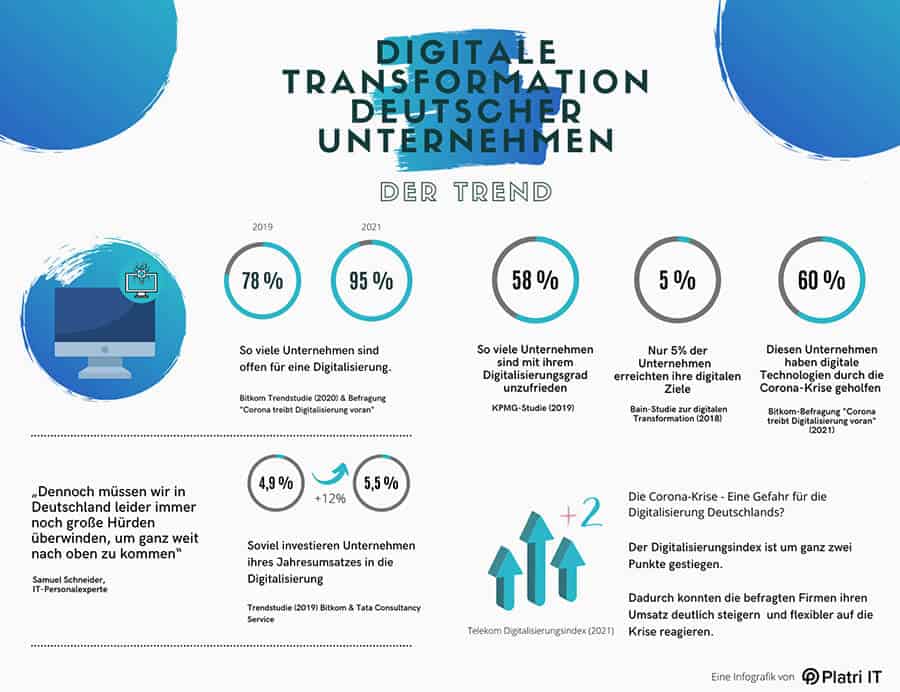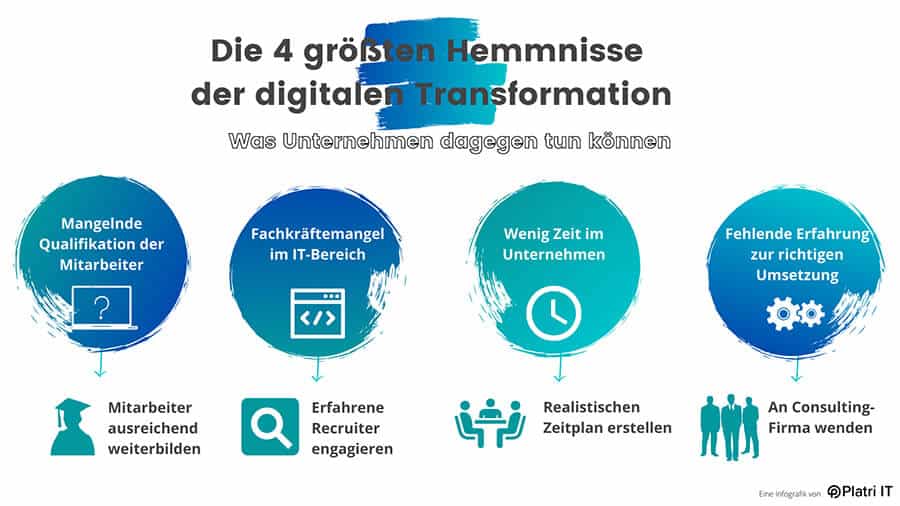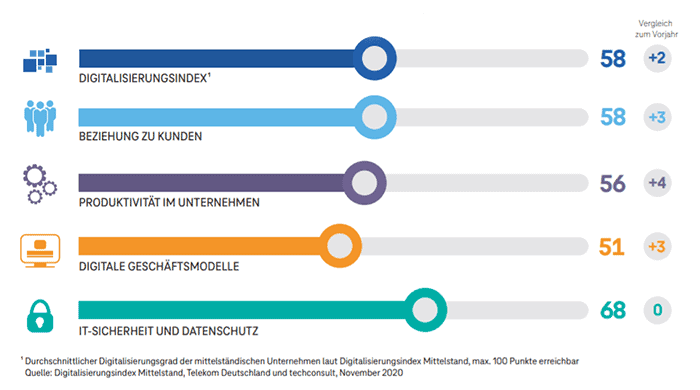Digital transformation
Many companies are dissatisfied with their own digital transformation. Only a fraction of companies actually achieve their digital goals. However, the benefits of transformation are obvious, as can be seen from the surge in digitalisation triggered by the coronavirus crisis.
This is also shown by the current results of the latest studies on digital transformation in companies across Germany. In this article, we will give you an insight into the most important studies on the current situation, explain which obstacles still need to be overcome and show exactly how the pandemic has contributed to the upswing in digitalisation.
1.What is digital transformation in companies?
The digital transformation in companies is a process of constant further development of technologies and therefore an important component of the coming years. This will have a lasting impact not only on the German economy, but also on society as a whole. As a result, customers expect increasingly modern business models over time, meaning that companies must adapt or digitalise their existing processes in order to remain competitive.
Major pioneers such as Amazon, eBay and Spotify are leading the way and fulfilling the ever newer needs of society: speed, transparency and simplicity.
Typically, digital change takes place on two levels – internal processes and customer interactions. Terms such as artificial intelligence, robotics and Industry 4.0 are now becoming increasingly relevant for companies.
Other important areas are:
- Cloud Computing
- Digital platformen (social media / intern netzworks)
- Big data and analytics
- Internet of Things
- and many more
The digitalisation of companies brings numerous advantages: contact with customers is becoming easier, more cost-effective and more individual. New customer groups and new sources of revenue can be tapped into, value creation processes optimised and the company organisation made more efficient.
As a result, companies reduce their competitiveness in the long term if they fail to utilise the digital transformation in companies and the associated sales and savings potential, ultimately taking a major risk.

“It is important to always stay on the ball and develop new business models in order to continue to grow. The flexibility of companies is very much in demand these days” – Yunus Kimyonok, founder& CEO
Although the advantages are obvious, more than half of the companies surveyed were not satisfied with their own level of digitalisation to date (KPMG AG, 2019).
Companies that fail to get their digital transformation underway will be left behind by their own competitors in just a few years. They should therefore urgently address this issue.
The problem here is that too few companies in Germany are still investing in a holistic digitalisation strategy, because according to the Bain study on digital transformation, only 5% of companies have achieved their digital goals to date. The example of the digital pioneers clearly shows that investing in a transformation pays off: they grow 50% faster and are therefore much more profitable.
2. Digitalisation of companies
There is already a certain basic affinity for digitalisation. According to a Bitkom survey on digitalisation in 2021, 95% of companies are already open to it. A full 5.5% of annual turnover is now being invested in the digitalisation of companies, an increase of 12% compared to the previous year.
A full 5.5% of the annual turnover of German companies is invested in digitalisation.
Bitkom also found that companies primarily invest in IT security solutions, data analysis software and their own online shops. However, collaboration tools, mobile websites and apps are also high on the list.
Cost factors at a glance

3. Obstacles to digital transformation in companies
In addition to investing in new technologies and IT experts, it is also important to look at other aspects of the company’s operations. The biggest obstacle to implementing a uniform digitalisation strategy in companies lies primarily in the insufficient qualification of employees.
Companies are usually not satisfied with the digital qualifications of their own employees.
In addition, a lack of time, a severe shortage of skilled labour in the IT sector and a lack of experience in implementing these strategies are major contributing factors.

The Etventure study from 2019 entitled “The future viability of German companies” revealed that a full 73% of companies believe that their employees are not sufficiently qualified in digital technologies.
“This is too high a figure, and it is imperative that we work on it,” says Yunus Kimyonok, CEO and founder of Platri IT, who himself employs only digital-savvy staff. Many companies even see this as the biggest obstacle to driving forward their own digital transformation.
To counteract this, the majority (81%) of companies are already in the process of promoting this expertise.
Nevertheless, a standardised cultural change is still urgently recommended, as the positive attitude of employees is also needed. This is because the Bitkom trend study shows that only half of the workforce quickly accepts or embraces new technologies.

“The more digitalised the company, the greater the need for technical solutions and therefore also for IT specialists. The shortage of IT specialists is slowing down the digital transformation in companies and therefore also their ability to innovate and compete.” – Samuel Schneider, IT HR expert
Bitkom recorded a record 124,000 job vacancies in 2019, which fell again to 86,000 due to the coronavirus crisis. Nevertheless, the figures are still far too high and work needs to be done across Germany.

Companies should not only focus on the technologisation of processes, but should always look at the whole picture. Developing and implementing a digitalisation strategy is not always easy, which is why it makes sense to bring an expert on board. With an objective view and years of expertise, they can identify the most important pivotal points that a company needs in order to digitalise successfully.
4. Positive effects on the digital transformation
The annual survey of Deutsche Telekom’s Digitalisation Index 2021 shows that the coronavirus crisis has already had a positive impact on the digital transformation of German companies. The index has risen by a whole 2 points (to 58 out of a possible 100 points).
As a result, the companies surveyed were able to increase their turnover by at least 38%, and large companies by as much as 75%. Companies that were already well positioned digitally are therefore much more resilient to crises and react more flexibly to serious consequences. As a result, these companies can implement new business models more quickly.

Telekom (2021): Digitisation index for SMEs 2020/2021Telekom (2021): Digitisation index for SMEs 2020/2021
Nevertheless, the crisis has also left negative traces. Almost half of companies were forced to adapt their business model, services or products at short notice during the pandemic in order to survive. Almost half of all companies in a Bitkom survey have come through the pandemic very badly.
However, digital technologies helped 6 out of 10 companies to cope well with the pandemic. Companies that were already well-positioned digitally came through the crisis more easily.
A survey by Deutsche Telekom even shows that many top digitisers are satisfied with their sales. However, the concern that working from home could have a negative impact on productivity and efficiency has not materialised. In fact, 86% of companies emphasise the exact opposite.
It is clear that entrepreneurs also recognise the value of digitalisation, as investment in digital transformation technologies continues to increase despite the crisis. While 78% of the companies surveyed in the Bitkom trend study were still open to transformation in 2019, 95% of the companies in the above-mentioned Bitkom survey have now become more important.
5. Conclusion on digital transformation in companies
This is how we see it: the coronavirus crisis has already clearly shown how important it is to be well-positioned digitally in order to guarantee the security and competitiveness of companies. Many companies now want to jump on the bandwagon and digitalise their business model to a much greater extent.
We at Platri IT share this view and therefore recommend developing a uniform digitalisation strategy, investing an appropriate proportion of annual turnover in the digital transformation of the company and responding to new customer needs.
- The trend is moving in the right direction: companies are open to digitalising their business and are already investing significantly more.
- In addition to the lack of technological development, other obstacles need to be removed before standardised transformation can take place.
- The COVID-19 pandemic is providing a positive boost to digital transformation. Companies that were already well-positioned digitally have come through the crisis better.
Do you have any questions or suggestions about the article? Then please send us an e-mail to info@platri.de.

Do you have further questions about digital transformation in companies?
You can reach us from Monday to Friday between 9:00 am and 5:30 pm. We look forward to hear from you!
info@platri.de
Phone
0234 497 014 47
Do you have any further questions about our article, this topic or app development costs at Platri IT? Then please get in touch with us. If you are interested in a job at Platri IT, we look forward to your visit to our career portal. We look forward to hearing from you!

